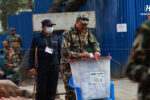KATHMANDU: Nepal has made no progress on justice for crimes under international law in the 15 years since the signing of the Comprehensive Peace Agreement (CPA), four international rights organisations said.
The Amnesty International, International Commission of Jurists, Human Rights Watch and TRIAL International said that the government of Nepal should put the needs of victims’ front and center and set out a clear timeline for holding meaningful consultations and upholding its legal obligations.
“Successive Nepali governments have pledged to deliver truth, justice and reparations to victims, including by implementing a 2015 Supreme Court ruling to amend the transitional justice law to disallow amnesties for serious crimes. Nevertheless, they have repeatedly failed to do so. Instead, the two transitional justice commissions have become inactive, while successive governments have used their theoretical existence as a pretext to prevent cases from proceeding through the regular courts,” read the statement.
The authorities’ reluctance to meet their obligation to investigate and prosecute grave crimes has deepened the suffering of victims, undermined the rule of law, and increased the risk of future violations, it said.
It said that as long as justice is denied in Nepal, those allegedly responsible for international crimes committed during the conflict remain vulnerable to prosecution abroad under the principle of universal jurisdiction.
The CPA signed on 21 November 2006, between the then government and former Maoist rebels contained a commitment “to investigate the truth about people seriously violating human rights and involved in crimes against humanity.”
“Nepal’s international partners should press the government to fulfill its legal obligations and fulfill its commitments on justice and accountability, and stand ready to support a credible justice process,” Director of Amnesty International Nepal Nirajan Thapaliya is quoted as saying in the statement.








Comment